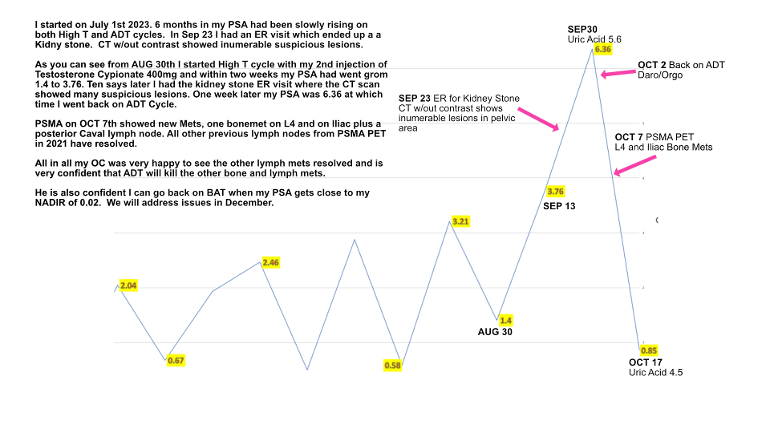Hi fellow warriors,
I have an update on my BAT n=1 experiment.
Above is a graph of my Recent Uric Acid and PSA results. As you can see my PSA skyrocketed in one month while on cBAT cycle. The end of the graph above depicts my first 30 days cBAT with my ER visit and subsequent PSA and Uric Acid measurements.
After being on Orgovyx and Darolutamide for approx. 1 1/2 years I decided to try Russ' pBAT (propionate BAT) where one uses testosterone propionate injections every other day for 2 weeks then Daro/Orgo 2 weeks then 1 week to clear and rinse & repeat.
Well, I did this for 15 months with good results until about 6 months into it my PSA started slowly rising on both end of High T and end of ADT cycles. I decided to try the cBAT protocol which one is on High T for 2 months then ADT for a month rinse & repeat.
I was 1 month into High T on cBAT when I had to go to the ER for what turned out to be kidney stone and gout. I measured my Uric Acid and PSA a week later and it was 5.6 and 6.36 respectively.
Notice the High Uric Acid and Very High PSA peak then the precipitous drop after going back on ADT and drinking applecider vinegar and lemon juice every morning plus I also stopped all fruits and anything to do with fructose plus cut back on carbs.
I had a PSMA scan due to the CT without contrast stating I had innumerable highly suspicous lesions including spine and pelvic bone. Which ended up true to some extent (L4 and Iliac Mets.)
Here is a recent article on the relationship of Uric acid and PSA for prostate cancer patients.
